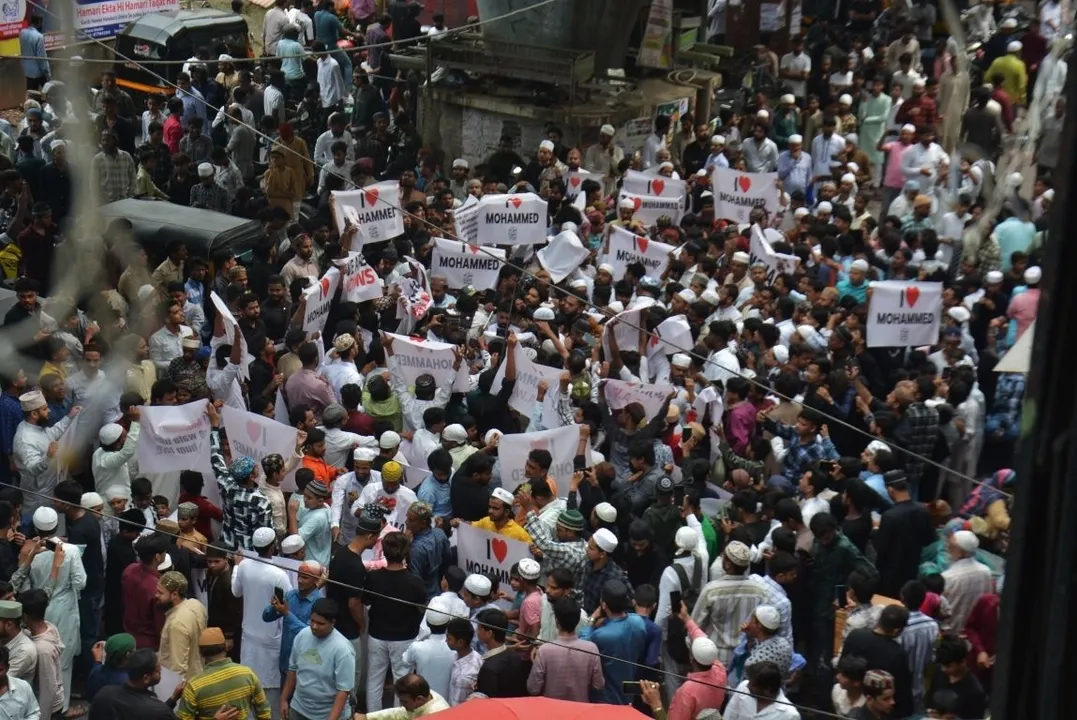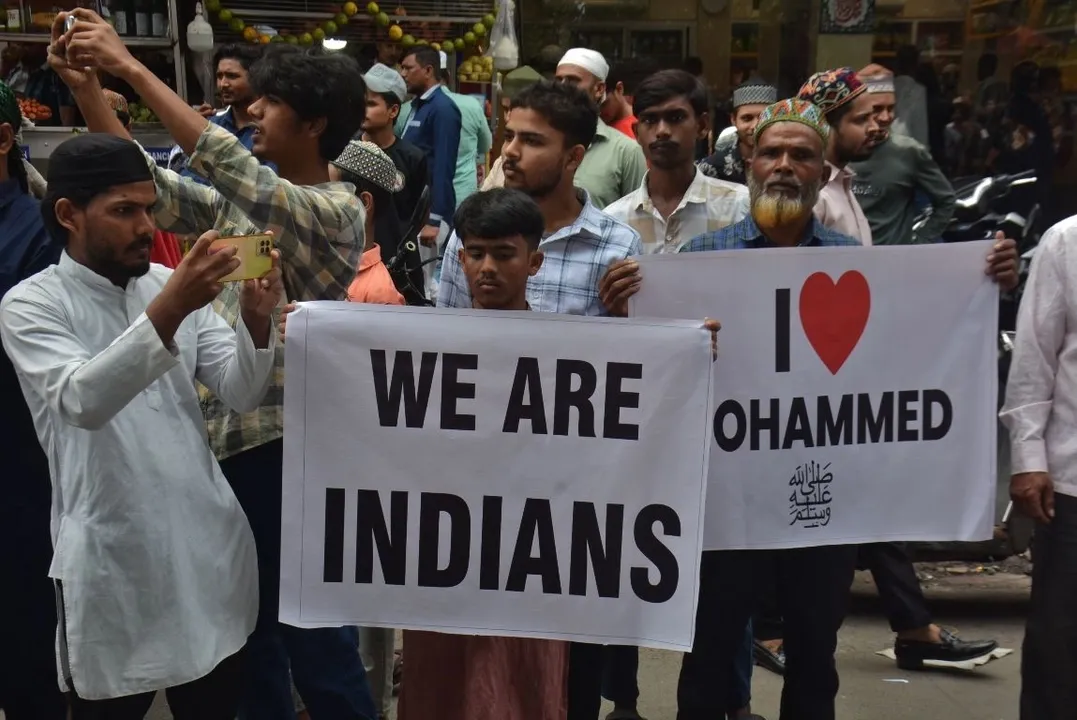Sport
Dollar
42,0187
0.15 %Euro
49,0800
-0.27 %Gram Gold
5.725,2700
-1.68 %Quarter Gold
10.114,3100
1.99 %Silver
70,0500
-4 %Across BJP-ruled states, peaceful religious expression is met with arrests and home demolitions, raising serious concerns about shrinking space for Muslim identity and religious freedom in India.
In several Indian states ruled by the Bharatiya Janata Party (BJP), authorities have in the last month arrested Muslim men, raided, and in some cases, bulldozed their homes.
The trigger?
Simple expressions like writing or posting “I love Muhammad” on posters, T‑shirts and social media.
It all started after a banner, reading “I love Muhammad”, meant to be a routine decoration, was displayed prominently during Eid-e-Milad-un-Nabi processions marking the Prophet Muhammad’s birthday, in Kanpur, Uttar Pradesh.
That banner triggered objections, FIRs, and an aggressive state response: arrests under Indian Penal Code sections including 153A (promoting enmity), and house demolitions justified by claims of illegal encroachment or riot prevention.
The backlash rippled to many other states.
As per the nonprofit Association for Protection of Civil Rights (APCR), as of September 23, at least 21 FIRs had been registered against more than 1,300 Muslims, and at least 38 arrests had been made across multiple states governed by the BJP.
APCR said the arrests highlight a concerning trend of criminalisation of peaceful protest.
In Uttar Pradesh (UP) alone, 16 FIRs and over 1,000 people have been accused across multiple districts (Unnao, Baghpat, Kaiserganj, Shahjahanpur, Kaushambi) under these cases, Indian media outlets reported.
In Uttarakhand’s Kashipur, one FIR listed 401 accused, with seven arrests.
Beyond UP, states such as Gujarat, Maharashtra, Telangana have seen cases, too.
“Targeting people for expressing their love and respect for the Prophet is a gross violation of fundamental rights. Peaceful religious expression should never be criminalised,” Nadeem Khan, national secretary of APCR told Maktoob Media.
Across several incidents, videos showed young Muslim men holding placards and chanting the slogan peacefully.

In response, local police filed FIRs, citing potential to incite communal tension, though no violence was recorded at the events themselves.
“It is absurd that the state should target people for saying ‘I love Muhammad’, which is a peaceful expression and devoid of any incitement or threat,” Aakar Patel, the chair of the board of Amnesty International India, told TRT World.
“It does not meet the threshold for criminal restriction under either Indian constitutional law or international human rights law. Public order concerns must be addressed proportionately and cannot justify blanket suppression of religious identity or expression, as is happening here.”
Demolitions and ‘bulldozer justice’
In Bareilly, UP, following clashes during a protest over the “I Love Muhammad” slogan on September 26, local authorities targeted several buildings tied to the accused. Some were bulldozed, including a banquet hall owned by Dr Nafees, a close aide of Maulana Tauqeer Raza Khan, the leader of a regional UP party, Ittehad-e-Millat Council (IMC).
Officials claim that these demolitions are part of a “routine, legal procedure”, but the aggrieved families say it is deliberate.
“If the authorities had given us a notice we would have removed the furniture from inside the banquet hall. We suffered losses worth crores of rupees,” a caretaker of the now-demolished banquet hall told Times of India.
Critics say many of these demolitions took place without prior notice, violating legal norms and court judgments. A plea has been filed in a human rights commission, claiming that no demolition notices were issued in Bareilly before properties were razed.
In Gujarat’s Bahiyal region, after communal clashes linked to social media posts (including “I Love Muhammad”), authorities declared 186 structures “illegal” and reportedly demolished 178 of them. Residents claim targeted action, late‑night raids, and no due process.
The Supreme Court of India has flagged how “instant demolitions”, often called “bulldozer justice”, are used in states ruled by the BJP and affect minorities more heavily.
In November 2024, India’s apex court issued guidelines condemning demolitions without due process, including mandating prior notice and video recording of demolition actions.
The state often defends demolitions as “anti‑encroachment” or to enforce building norms.
In Bareilly, officials claimed the properties were illegally constructed.
However, affected families counter that many such demolitions were retrospective punishments, not neutral legal enforcement. They allege a lack of notice, a lack of hearings, and that notices served were after the fact.

Rights groups and legal experts say this marks a dangerous escalation in the criminalisation of Muslim identity and peaceful religious expression in India.
“From a constitutional standpoint, such arrests and demolitions appear inconsistent with India’s guarantees under Articles 19(1)(a) and 25 of the Constitution, which protect freedom of expression and the right to profess and practice one’s religion,” Prasouk Jain, a Delhi-based lawyer, told TRT World.
He said the slogan ‘I love Muhammad’ is a legitimate expression of faith, not incitement.
“Any state action punishing peaceful religious expression would therefore be disproportionate and likely unconstitutional unless linked to clear threats to public order under Article 19(2),” he explained.
Shrinking space for Muslim identity
The demolition tactic is not new in BJP-governed states.
Critics argue this represents a form of collective punishment that bypasses judicial process entirely.
Legal activists and civil society groups are urging the courts to intervene, warning that these actions threaten both religious freedom and the rule of law in India.
Bibhu Pattnaik, a US-based journalist and media professional, opined that these recent actions have once again brought attention to how sensitive expressions in public spaces are being handled.
He said maintaining law and order is important, but warned that the manner in which these incidents are addressed should not create “fear or further polarisation”.
“Authorities need to ensure that enforcement remains proportionate and fair, without appearing to suppress individual voices,” he said.
The crackdown reflects a disturbing truth: in today’s India, even harmless religious pride by a Muslim can be painted as criminal, provocative, or subversive.
Bulldozers have become not just construction tools, but symbols of state-sanctioned reprisal.
Comments
No comments Yet
















Comment